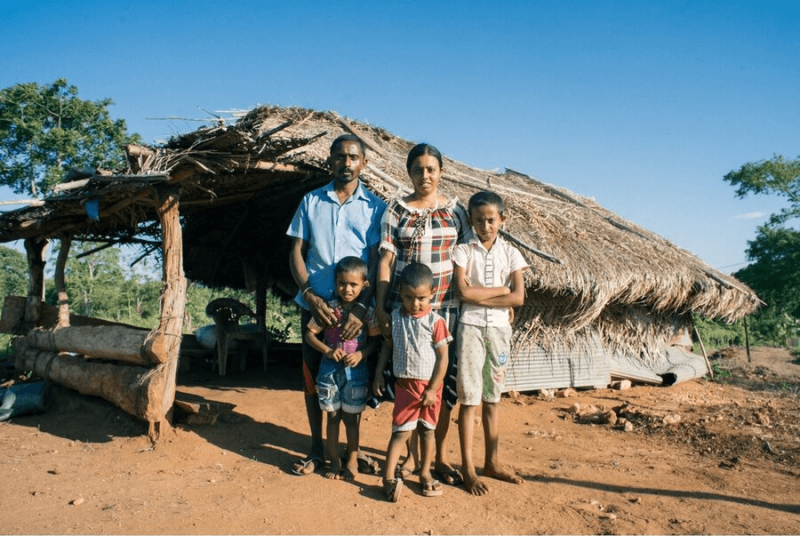Man-made disasters are the worst. They are totally unnecessary. Yet we can learn from them, and what just happened in Sri Lanka is an eye-opener and offers warnings about food production for the rest of the world—and perhaps most especially for my country of India.
When Sri Lankan President Gotabaya Rajapaksa announced last year that his island nation would reject conventional agriculture and immediately go 100-percent organic, many commentators predicted a catastrophe. I was one of them, calling this radical decision “a massive failure” that would hurt the country and its people.

Sri Lanka’s tragic error was the stuff of a wild thought experiment: What would happen if a whole nation were to abandon the tools of modern agriculture and go back to the way farming was done more than a century ago?
We no longer need to wonder about the result. We have the hard evidence of a humanitarian and economic crisis that has engulfed a nation of more than 21 million people.
Those who are serious about agriculture know that organic farming won’t work on a large scale. It simply cannot meet the needs of food production. It can thrive when it presents consumers with one choice among many in a diverse marketplace. By contrast, forcing every farmer in an entire country to adopt its primitive practices, such as the rejection of synthetic fertilizers and crop-protection devices, is an exercise in lunacy.
Yet this is what many ideologues insist that they want. Vandana Shiva, an influential Indian activist, has praised Sri Lanka for its ruinous farming policies: “Let us all join hands with Sri Lanka,” she tweeted on June 11, 2021.
#SriLanka has already banned all chemicals and announced a transition to 100% Organic Sri Lanka
Let us all join hands with Sri Lanka, the #Swiss & every community taking steps towards a #PoisonFree #PoisonCartelFree world for our health & the health of the planet @NavdanyaInt https://t.co/6VO87kLzUZ— Dr. Vandana Shiva (@drvandanashiva) June 11, 2021
And on July 12, 2022, just 13 months later, the Sri Lanka president who had followed her false and mischievous propaganda fled his country on a military jet and resigned from his position, abandoning his hungry citizens and leaving them in a great food, fuel and economic crisis.
Today, Sri Lanka has a new president: Ranil Wickremesinghe, who confronts the unenviable task of cleaning up the mess left by his predecessor. He’ll have to restore growth and help farmers, who in normal times produce lots of rice as well as the world’s best tea. Over the last year, however, Sri Lanka has been forced to import large amounts of rice and has watched its tea exports drop by 18% from November 2021 to February 2022, losing $425 million due to the reduced tea exports.
Wickremesinghe can start by looking to a positive example in our region: Bangladesh has taken advantage of the latest technology to improve a staple crop. Its adoption of Bt brinjal (eggplant) has boosted production and reduced the use of pesticides, in a victory for agricultural and environmental sustainability.
This shows what can happen when leaders see technology as a solution rather than a problem. When farmers enjoy access to technology, they can improve their own operations as well as pass on the benefits to consumers and others. This was the great lesson of Norman Borlaug and the Green Revolution—and it’s the lesson of our times as well, as responsible scientists unleash the potential of biotechnology, gene-editing, crop protection and more.
Activists like Shiva never seem to pay a price for promoting their harmful ideas. She remains unrepentant over the wreckage of Sri Lanka. While Dr. Borlaug saved over a billion lives, Vandana Shiva has been ruining billions through her fictitious allegations against conventional farm practices and casting baseless fears in the minds of the people.
I’ve never met Shiva, but I’ve jousted with her online. When I challenged her with a few questions about GM crops, however, she blocked me from her social media. That’s her way of dealing with criticism. She refuses even to consider alternative points of view. She won’t look at evidence that makes her uncomfortable.
Sadly, some of the leaders in my own country have promoted the widespread adoption of organic farming, or what they sometimes call “natural farming.”
But let’s not fool ourselves: If India were to attempt what Sri Lanka just tried to do, it might lead to the worst food-security failure in history. Nearly 1.4 billion people live here—we’re about to pass China as the world’s most populous nation—and our calamity would be many times worse than Sri Lanka’s.
I wish Sri Lanka and its people were not mired in misery, but let’s at least learn from their mistake and not commit another man-made disaster, here or anywhere.
Mr. V. Ravichandran owns a 60-acre farm at Poongulam Village in Tamil Nadu, India where he grows rice, sugar cane, cotton and pulses (small grains). Mr. Ravichandran is a member of the Global Farmer Network, and the 2013 recipient of the Kleckner Global Farm Leader Award.
A version of this article was originally posted at Global Farmer Network and is reposted here with permission. Global Farmer Network can be found on Twitter @GlobalFarmerNet































